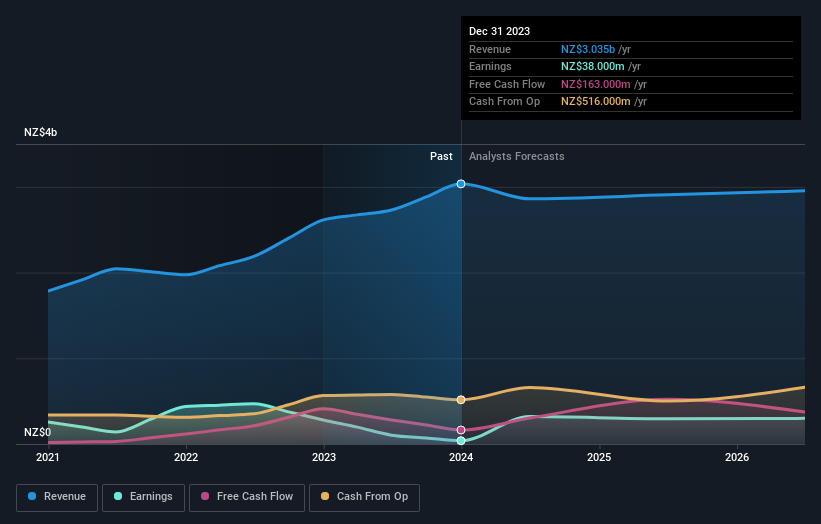- New Zealand
- /
- Electric Utilities
- /
- NZSE:MCY
Mercury NZ Limited Just Beat Revenue By 19%: Here's What Analysts Think Will Happen Next

Investors in Mercury NZ Limited (NZSE:MCY) had a good week, as its shares rose 3.4% to close at NZ$6.98 following the release of its half-yearly results. Mercury NZ beat revenue forecasts by a solid 19% to hit NZ$1.6b. Statutory earnings per share came in at NZ$0.074, in line with expectations. Following the result, the analysts have updated their earnings model, and it would be good to know whether they think there's been a strong change in the company's prospects, or if it's business as usual. We thought readers would find it interesting to see the analysts latest (statutory) post-earnings forecasts for next year.
View our latest analysis for Mercury NZ

After the latest results, the consensus from Mercury NZ's five analysts is for revenues of NZ$2.86b in 2024, which would reflect a measurable 5.7% decline in revenue compared to the last year of performance. Statutory earnings per share are predicted to soar 732% to NZ$0.23. In the lead-up to this report, the analysts had been modelling revenues of NZ$2.76b and earnings per share (EPS) of NZ$0.20 in 2024. So it seems there's been a definite increase in optimism about Mercury NZ's future following the latest results, with a solid gain to the earnings per share forecasts in particular.
Althoughthe analysts have upgraded their earnings estimates, there was no change to the consensus price target of NZ$6.24, suggesting that the forecast performance does not have a long term impact on the company's valuation. It could also be instructive to look at the range of analyst estimates, to evaluate how different the outlier opinions are from the mean. There are some variant perceptions on Mercury NZ, with the most bullish analyst valuing it at NZ$7.18 and the most bearish at NZ$5.20 per share. Analysts definitely have varying views on the business, but the spread of estimates is not wide enough in our view to suggest that extreme outcomes could await Mercury NZ shareholders.
Looking at the bigger picture now, one of the ways we can make sense of these forecasts is to see how they measure up against both past performance and industry growth estimates. We would highlight that revenue is expected to reverse, with a forecast 11% annualised decline to the end of 2024. That is a notable change from historical growth of 9.9% over the last five years. Compare this with our data, which suggests that other companies in the same industry are, in aggregate, expected to see their revenue grow 0.8% per year. So although its revenues are forecast to shrink, this cloud does not come with a silver lining - Mercury NZ is expected to lag the wider industry.
The Bottom Line
The most important thing here is that the analysts upgraded their earnings per share estimates, suggesting that there has been a clear increase in optimism towards Mercury NZ following these results. They also upgraded their revenue estimates for next year, even though it is expected to grow slower than the wider industry. There was no real change to the consensus price target, suggesting that the intrinsic value of the business has not undergone any major changes with the latest estimates.
Keeping that in mind, we still think that the longer term trajectory of the business is much more important for investors to consider. We have forecasts for Mercury NZ going out to 2026, and you can see them free on our platform here.
And what about risks? Every company has them, and we've spotted 4 warning signs for Mercury NZ (of which 1 makes us a bit uncomfortable!) you should know about.
If you're looking to trade Mercury NZ, open an account with the lowest-cost platform trusted by professionals, Interactive Brokers.
With clients in over 200 countries and territories, and access to 160 markets, IBKR lets you trade stocks, options, futures, forex, bonds and funds from a single integrated account.
Enjoy no hidden fees, no account minimums, and FX conversion rates as low as 0.03%, far better than what most brokers offer.
Sponsored ContentNew: Manage All Your Stock Portfolios in One Place
We've created the ultimate portfolio companion for stock investors, and it's free.
• Connect an unlimited number of Portfolios and see your total in one currency
• Be alerted to new Warning Signs or Risks via email or mobile
• Track the Fair Value of your stocks
Have feedback on this article? Concerned about the content? Get in touch with us directly. Alternatively, email editorial-team (at) simplywallst.com.
This article by Simply Wall St is general in nature. We provide commentary based on historical data and analyst forecasts only using an unbiased methodology and our articles are not intended to be financial advice. It does not constitute a recommendation to buy or sell any stock, and does not take account of your objectives, or your financial situation. We aim to bring you long-term focused analysis driven by fundamental data. Note that our analysis may not factor in the latest price-sensitive company announcements or qualitative material. Simply Wall St has no position in any stocks mentioned.
About NZSE:MCY
Mercury NZ
Engages in the production, trading, and sale of electricity and related activities in New Zealand.
Slightly overvalued with limited growth.
Similar Companies
Market Insights
Community Narratives



